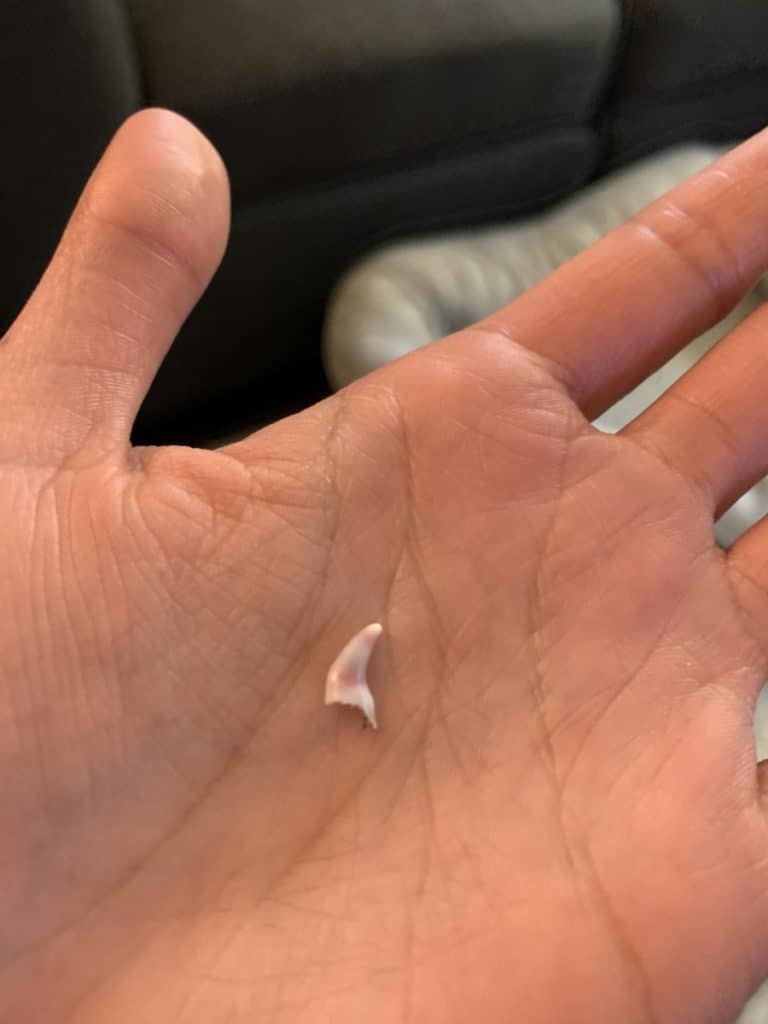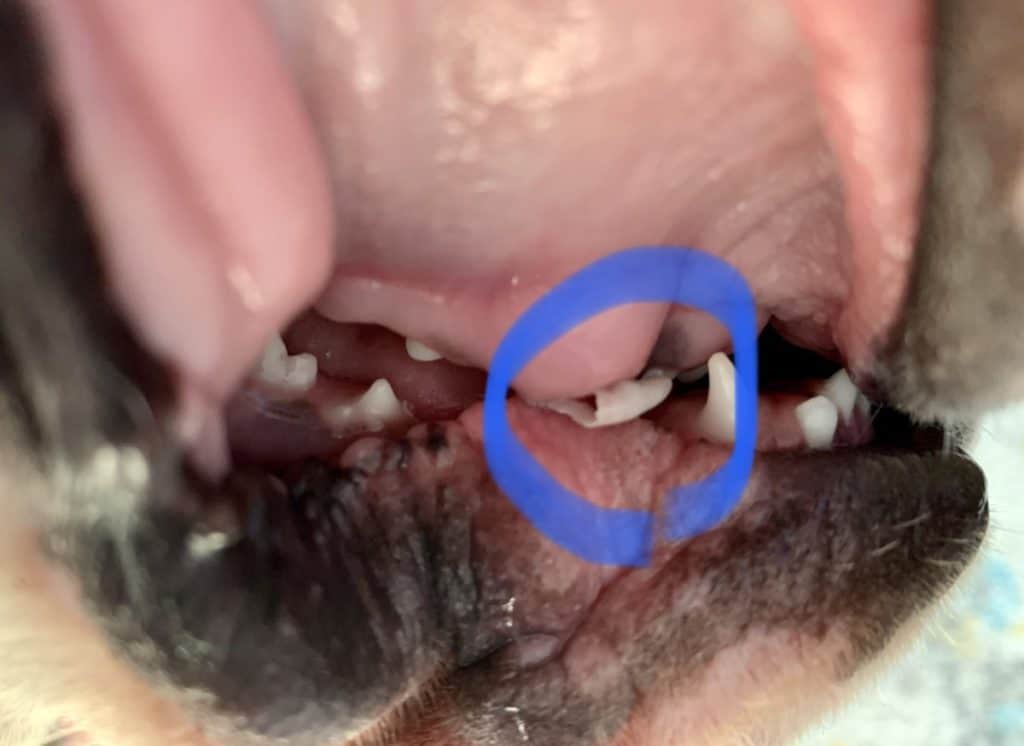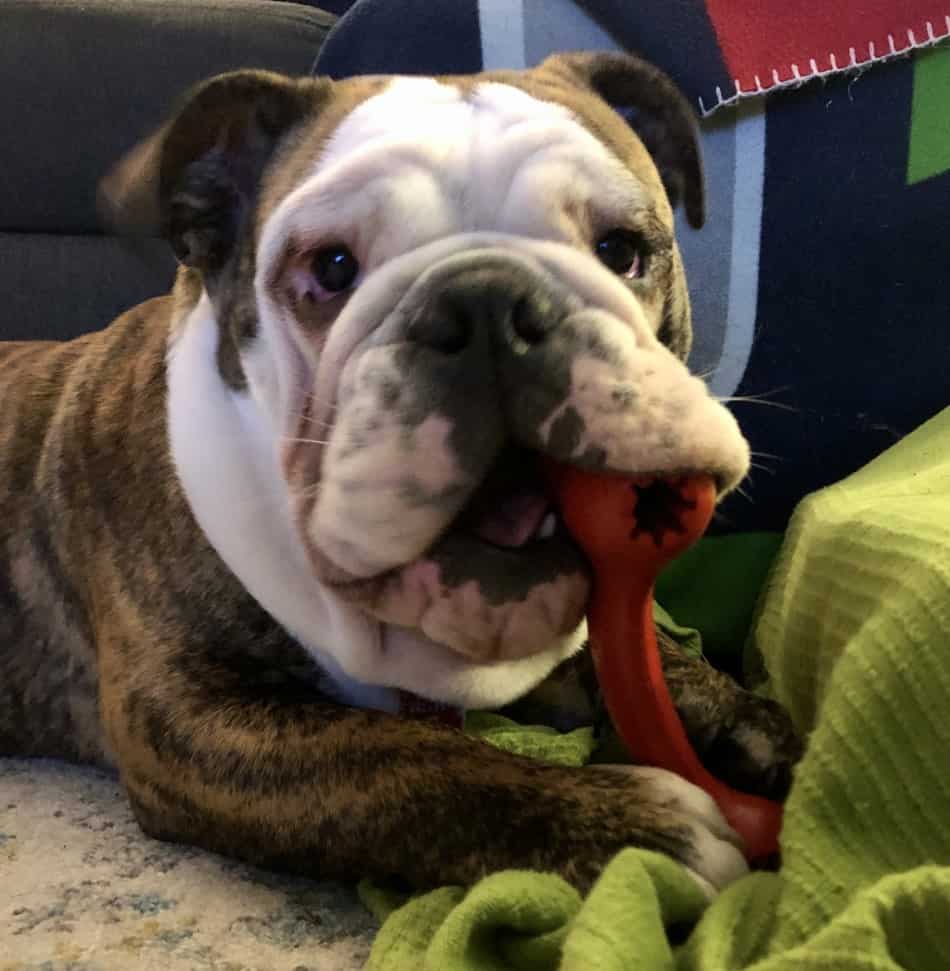Snaggle tooth. Underbite. Generally misaligned teeth. Bulldogs are quite famous for their funny teeth and it’s just one of the many characteristics that make this breed so adorable. If you have a bulldog that has a unique set of teeth, you might be wondering how he or she compares to her brethren. But first, you’ll need to know how many teeth bulldogs have in general, before you can see how your dog fits in (and know if he or she is missing any teeth!)

How many teeth do English bulldogs have?
An adult English bulldog has 42 teeth, which is approximately a third more than humans. A puppy has 28 teeth and the rest grow as the English bulldog ages.
How many teeth do other breeds of dogs have?
Adult dogs of other breeds also have 42 teeth, like English bulldogs.
Interested in learning more about bulldogs? We got you covered, check out our posts on some commonly asked bulldog questions:
Why do bulldogs sleep sitting up?
Common bulldog allergies and what you can do about it.
How many teeth do bulldogs have in their upper jaw?
The dental composition of fully grown English bulldogs and puppies is quite different. Adult English bulldogs have 20 teeth in their upper jaw, so if it appears that your dog has fewer than that, it is possible they might have broken or lost a tooth. If you think your dog is suffering from a broken or missing tooth, it’s best to contact your vet right away!
English bulldog puppies have a total of 28 teeth which are equally distributed across their upper and lower jaws, resulting in 14 teethe each.
How many teeth do bulldogs have on the bottom jaw?
English bulldogs have 22 teeth in their lower jaw, while puppies, as mentioned above have 14 teeth.
What kind of teeth do bulldogs have?

1. Incisors: English bulldogs have 12 Incisors, which are equally distributed in the upper and lower jaws. They appear in the front of the upper and lower jaw.
2. Canines: Bulldogs have two canines, or fangs, in each jaw. These canines come right behind the incisors.
3. Premolars: Premolars start after the canines. These are flat and broad yet retain the pointed structure of canines. Adult bulldogs have a total of 16 premolars, with eight premolars present in each jaw.
4. Molars: Bulldogs have six molars in the lower jaw and four in the upper one. In the lower jaw, three molars are situated on each side, whereas, in the upper jaw, two molars are on either side. Molars are less sharp and more wide as compared to premolars.
If you’re wondering what are the best products to use for your English bulldog, including dog toothpaste, we got you covered. We created a recommended products page which links to every product we personally use for our English bulldog, Ollie.
Do bulldogs lose teeth when they’re puppies?
English bulldog puppies have 28 teeth, which start to emerge around the 4-week mark. However, from 14 to 30 weeks, these teeth generally fall, and are soon replaced by 42 adult teeth. This is the time when your puppy will experience teething, so make sure to provide them with soft chew toys to help soothe their pain!
Our bulldogs starting losing his teeth around the four-month mark.

Do bulldogs lose teeth when they’re adults?
Yes, occasionally, English bulldogs can lose a tooth or two when they are adults. This is not entirely normal but not unheard of either, and can be caused for many reasons including:
1. Physical accidents: If a dog is struck in the face with an object or has a direct impact on the jaw, a tooth or a few teeth could fall out. In such a case, it is a good idea to consult your vet right away.
2. Hard foodstuffs: When the dog tries to chew something which is pretty hard like a deer antler, or an extremely hard bone, there is a possibility that teeth loss might occur. In this case, the loss of tooth might be complete, or it might be a slight chip in your dog’s tooth. In either case, it is a good idea to consult your vet to provide proper relief to your dog. This is why we recommend monitoring your dog while he enjoys harder treats to make sure no teeth are damaged in the process.
3. Gum disease: Another cause of tooth loss is gum disease. If your dog suffers from plaque or tartar, bacteria can develop in their mouth. In such a case, it can impact the gum line as well and can lead to the loss of fangs and other teeth. This is why dental hygiene is important, to ensure your dog has a nice, beautiful set of pearly whites.
How to care for your bulldog’s mouth
Many dog owners often ignore the dental health of their dogs. The truth is that you should not wait for a problem to crop up. When you are proactive about your dog’s dental hygiene, it is easier to avoid larger health problems altogether. Here are a few tips to keep your dog’s teeth healthy:
1. Brush regularly: One of the best solutions to avoid any dental disease or tooth decay is to brush your dog’s mouth regularly. Many pet owners avoid this because it is not an easy task. However, it requires some practice. Also, the sooner you start; the easier it will be for you to make your dog accustomed to it.
Ideally, you should start brushing your dog’s teeth when he or she is a puppy, so that they become accustomed to this action at an early age. Make sure you use the right kind of toothbrush and toothpaste – your vet might be able to recommend a few options. We recommend that you brush your dog’s teeth once or twice a week, but it’s a good idea to check your dog’s teeth daily for any signs of dental issues.
2. Use dental chews: Dental chews, as the name suggests, are nothing but things which your dog will love to chew. These can include marketed dental chews, or other items such as rawhide bones, knuckle bones, marrow bones, or bones made of hard nylon. Chewing on these bones essentially acts as a means by which your dog can floss.
My bulldog absolutely loves these dental chews which can be found on Amazon. He gets one every night before bed and they keep his mouth smelling fresh!
What is the best diet for strengthening your bulldog’s teeth?

In general, dry dog foods can help reduce plaque in your dog’s mouth, to a certain extent. It is best to avoid foods that contain synthetic ingredients or preservatives as they can often cause tartar and plaque in your dog’s mouth. They can cause other health issues beyond your dog’s teeth, so it’s best to avoid them if possible.
Three of the most common dental issues in English Bulldogs
1. Plaque and tartar: Yes, you’re not the only one who can suffer from this, but your dog can too!
2. Periodontal disease: This can impact your dog’s tissue can lead to gingivitis.
3. Toothache: Your dog might suffer from a toothache for a variety of reasons, including:
• Food stuck in their molars
• Attempting to chew something hard
• Mouth infection
These are some of the most common dental problems which bulldogs often suffer from. as mentioned above, dental hygiene is an important thing to keep in mind to ensure your dog is healthy and well-cared for.
Sources:

